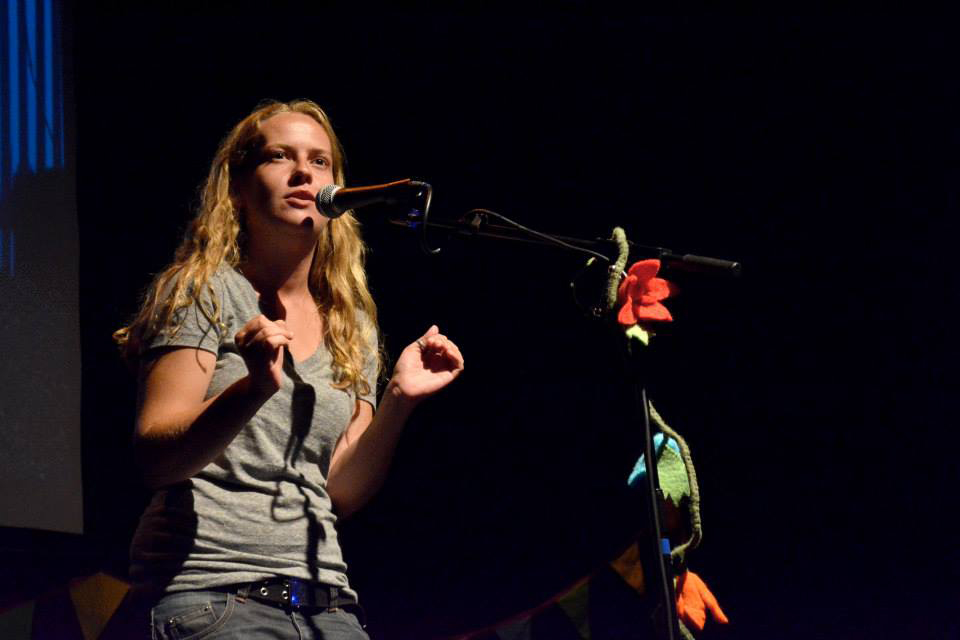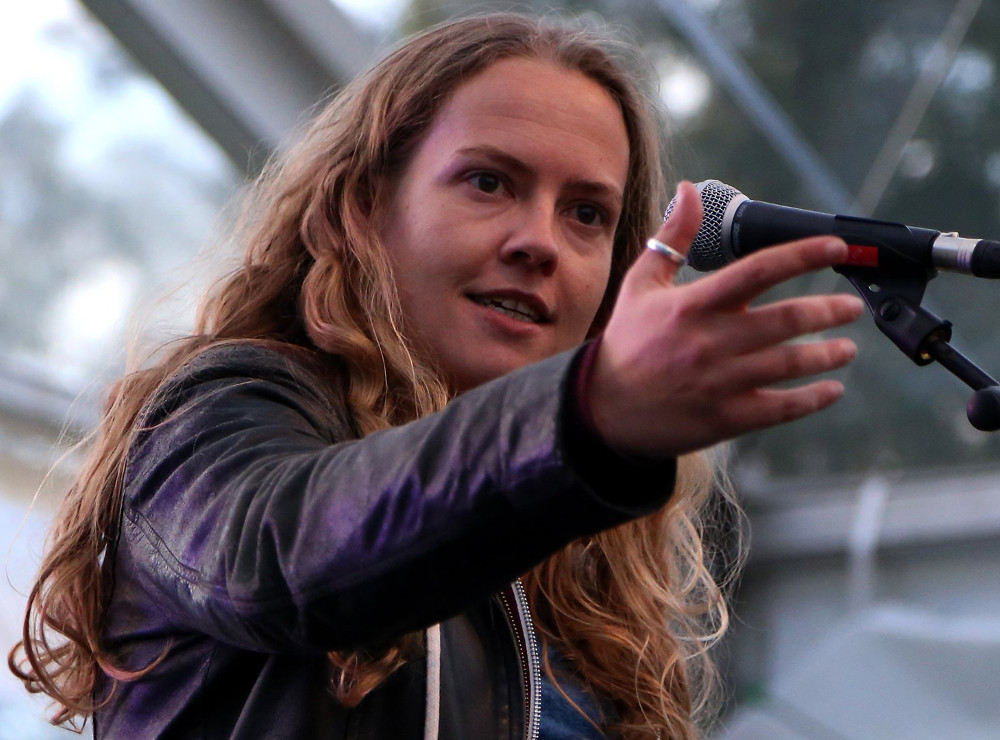Poet and playwright Sophia Walker makes the case for spoken word and performance literature.
It’s after midnight and I’ve just gotten home from two very different gigs: at 7.55pm I was on stage at the Royal College of Physicians unveiling a new commission on air pollution. I was performing in front of climate change experts, MPs, the Editor-in-Chief of The British Medical Journal...the sort of audience you feel you have no business speaking to as just a poet. Especially when the topic at hand is the human health impacts of air pollution. At 9.20pm I was in a basement performing to 15 lesbians (that’s not a stereotype, it was an LGBT gig) and one lovely straight man who’d wandered down from the bar upstairs out of curiosity.
That’s what spoken word is. That’s why we perform.
Literature is one of our greatest legacies as a species: all these stories and analyses, this philosophizing we have left behind us for generations. These attempts at exploring and uncovering what it is to be human. But the thing about literature is that you have to choose to read it. Which means you’ll pick up the books that are already of interest to you.
That wonderful man I met in the basement last night probably wouldn’t have sought out a book on what it’s like to be gay these days and why that’s suddenly an awful lot scarier now than it was in June. But by coming downstairs and choosing to participate (spoken word is a dialogue, after all), he ended up helping to create this eye-opening conversation we all had about Orlando, about privilege and ‘that Sky News interview’. We discussed what it is to be gay and he educated us on the challenges of being a straight man right now, how to be a decent man, and how he feels that sometimes both genders want that word to mean different things. How torn he feels. I’m sure I learned more from him than he learned from any of us.
When I hit the stage at that first gig of the evening, I saw this esteemed audience of highly accomplished people staring back at me looking confused, slightly suspicious and braced for boredom. If you’ve never seen performance poetry before, it’s attention grabbing. Combine the techniques and skill-set of page poetry with the performance skills of an actor, all tied up in rhythms intentionally entrancing for the ear. Spoken word is a powerful tool for imparting information and it is almost singularly good at firing people up. This is beginning to be noticed. Increasingly, spoken worders are being called on by politicians, by scientists, by academic communities to be the bridge between their hard data and making people see past the numbers to the real lives those numbers represent. We make people feel for a living, so we are perfectly placed to make data hit home.
It was one of the most inspiring, invigorating experiences I’ve ever had
I discovered spoken word after years as a journalist and playwright. When I saw my first plays performed, the director had taken them in a completely different direction than I’d intended. Clearly I wasn’t very good at playwriting back then. As a journalist, a copy editor pulled such a hatchet job on one of my articles I’m still ashamed it carries my by-line. In spoken word, I found a place where I was allowed to get up in front of a group of strangers and be listened to. I could express my thoughts in precisely the way I’d intended, with no middleman. A room full of people sat in silence and listened to me and when I came off stage they wanted to engage with me, to discuss, debate. It was one of the most inspiring, invigorating experiences I’ve ever had. I don’t know of any other way that normal people from off the street are afforded the chance to speak for themselves and be heard. Truly heard. That opportunity is priceless and once you’re aware it’s out there, you want to be a part of it.
 And yet the performance side of the literature world is sometimes treated as a lesser offshoot. It’s not taken as seriously or it’s deemed the quality doesn’t have to be as high or there’s yet another debate on “legitimacy”. Somewhere along the way we decided that ‘literature’ is this singular category that requires a certain intellectual rigour; literature must be high-brow, it must be literary. This perception means that some people find the very concept of literature intimidating, off-putting, not necessarily for them. Spoken word is the subtle subverter in the room: metaphor, motifs, allegory, polyrhythms... broken down it is an incredibly complex and hugely technical form. We know our trochaic heptameter from our anapests. But spoken word as a genre is intentionally immediately accessible. Oral traditions have to be. It is inclusive, inviting, it gives you the impression “you could do this, too” which is why it is growing so fast, globally. The more you write, the more you involve yourself in the scene, the better you get and the more knowledgeable you become. Pretty quickly you find yourself reading reams of Blake or Yeats or Langston Hughes because to progress as a writer, you have to read. Suddenly, you’ve immersed yourself in the arts. One day, you look back and realise all this started in the basement of a pub one night. We have a genre that pulls people into the literary world on a random night out in a bar. That doesn’t make spoken word any less “literature”, but it definitely makes literature more: more accessible, more present, more inviting, more popular.
And yet the performance side of the literature world is sometimes treated as a lesser offshoot. It’s not taken as seriously or it’s deemed the quality doesn’t have to be as high or there’s yet another debate on “legitimacy”. Somewhere along the way we decided that ‘literature’ is this singular category that requires a certain intellectual rigour; literature must be high-brow, it must be literary. This perception means that some people find the very concept of literature intimidating, off-putting, not necessarily for them. Spoken word is the subtle subverter in the room: metaphor, motifs, allegory, polyrhythms... broken down it is an incredibly complex and hugely technical form. We know our trochaic heptameter from our anapests. But spoken word as a genre is intentionally immediately accessible. Oral traditions have to be. It is inclusive, inviting, it gives you the impression “you could do this, too” which is why it is growing so fast, globally. The more you write, the more you involve yourself in the scene, the better you get and the more knowledgeable you become. Pretty quickly you find yourself reading reams of Blake or Yeats or Langston Hughes because to progress as a writer, you have to read. Suddenly, you’ve immersed yourself in the arts. One day, you look back and realise all this started in the basement of a pub one night. We have a genre that pulls people into the literary world on a random night out in a bar. That doesn’t make spoken word any less “literature”, but it definitely makes literature more: more accessible, more present, more inviting, more popular.
Spoken word can be dismissed as entertainment (though there is nothing wrong with entertainment, and if it means that some of the world’s biggest music festivals now have quite large and popular stages for poetry, then more of that please!) But spoken word can also be a tool. We are able to effect change precisely because we can reach people in unexpected ways, in unexpected places and on unexpected topics. In 2013, word got out about the underground female spoken word scene in Jordan, and how these young women were speaking about feminism and championing women’s rights. I’ve been to LGBT gigs in countries where being gay is illegal and they have to club together to afford door security, and have to almost smuggle people in and out of the venue discretely. Spoken word is a hugely useful tool for activism. The social aspect of gigs makes it an effective form of organizing and uniting. And the great luxury of live genres is that we get to see who our audience is, and tailor our performance to them. We get to have a conversation; we get to challenge, and are challenged back. You don’t have to consciously choose to open this book or read that collection. We come to you: to your bars, to your schools, to your street corners and your music festivals.
We are learning from the larger literature world, as quickly and as thoroughly as we can. But we are also trying to engage immediately and directly with our audiences, with the world we wrote those poems in. And for. Writing has always been a force for change. Some of us just can’t bear to wait for the printer.
© Sophia Walker, 2016






 And yet the performance side of the literature world is sometimes treated as a lesser offshoot. It’s not taken as seriously or it’s deemed the quality doesn’t have to be as high or there’s yet another debate on “legitimacy”. Somewhere along the way we decided that ‘literature’ is this singular category that requires a certain intellectual rigour; literature must be high-brow, it must be literary. This perception means that some people find the very concept of literature intimidating, off-putting, not necessarily for them. Spoken word is the subtle subverter in the room: metaphor, motifs, allegory, polyrhythms... broken down it is an incredibly complex and hugely technical form. We know our trochaic heptameter from our anapests. But spoken word as a genre is intentionally immediately accessible. Oral traditions have to be. It is inclusive, inviting, it gives you the impression “you could do this, too” which is why it is growing so fast, globally. The more you write, the more you involve yourself in the scene, the better you get and the more knowledgeable you become. Pretty quickly you find yourself reading reams of Blake or Yeats or Langston Hughes because to progress as a writer, you have to read. Suddenly, you’ve immersed yourself in the arts. One day, you look back and realise all this started in the basement of a pub one night. We have a genre that pulls people into the literary world on a random night out in a bar. That doesn’t make spoken word any less “literature”, but it definitely makes literature more: more accessible, more present, more inviting, more popular.
And yet the performance side of the literature world is sometimes treated as a lesser offshoot. It’s not taken as seriously or it’s deemed the quality doesn’t have to be as high or there’s yet another debate on “legitimacy”. Somewhere along the way we decided that ‘literature’ is this singular category that requires a certain intellectual rigour; literature must be high-brow, it must be literary. This perception means that some people find the very concept of literature intimidating, off-putting, not necessarily for them. Spoken word is the subtle subverter in the room: metaphor, motifs, allegory, polyrhythms... broken down it is an incredibly complex and hugely technical form. We know our trochaic heptameter from our anapests. But spoken word as a genre is intentionally immediately accessible. Oral traditions have to be. It is inclusive, inviting, it gives you the impression “you could do this, too” which is why it is growing so fast, globally. The more you write, the more you involve yourself in the scene, the better you get and the more knowledgeable you become. Pretty quickly you find yourself reading reams of Blake or Yeats or Langston Hughes because to progress as a writer, you have to read. Suddenly, you’ve immersed yourself in the arts. One day, you look back and realise all this started in the basement of a pub one night. We have a genre that pulls people into the literary world on a random night out in a bar. That doesn’t make spoken word any less “literature”, but it definitely makes literature more: more accessible, more present, more inviting, more popular.